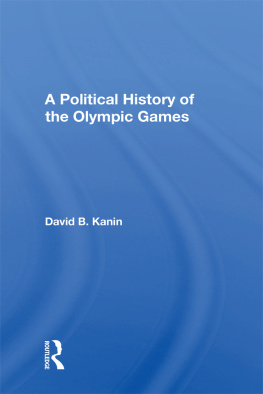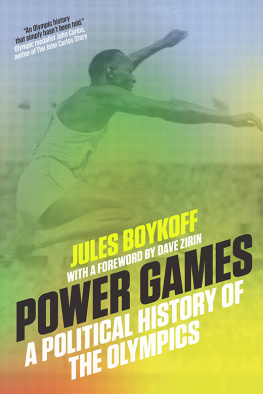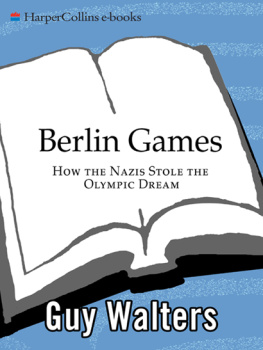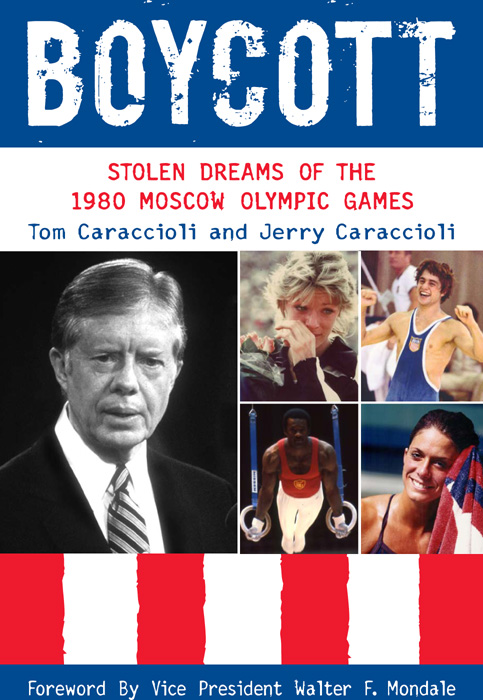
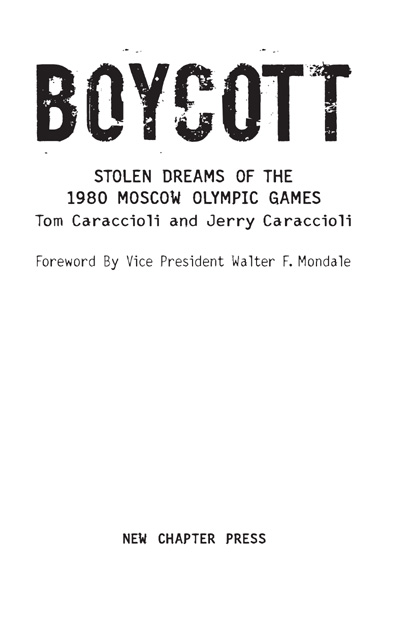
Table of Contents
Foreword
It has oft been said that sports offers the thrill of victory and the agony of defeat. In 1980, the Olympic Games, Winter and Summer, provided both and were bittersweet for me and many of my fellow Americans.
In February, I was thrilled to be in Lake Placid to open the Winter Games and be in the stands when the United States hockey team, which featured many players and the coach from my home state of Minnesota, won the gold medal. Two months later in April, I agonized over addressing the delegates of the United States Olympic Committee in Colorado Springs about the decision to boycott the Summer Games.
I have always been a sports fan, in general, and a fan of the Olympics, in particular. Though I was never quite a good enough athlete to make an Olympic team while growing up in southern Minnesota, I have always marveled at those who were able to accomplish that goal. I have a great sense of loyalty and empathy to the kids who didnt get the chance to live their dream of competing in the 1980 Olympic Summer Games in Moscow. For many, they only had a couple of years in their prime and would never get another chance like that again. They lost a big point in their lives that they werent going to be able to reclaim. I know this is still a very raw moment in American history, and for that I am sorry.
I will always remember meeting with those athletes in the White House. Like they had been when the announcement was made to boycott the Games in Colorado Springs, they were very respectful and dignified despite the fact that in their hearts Im sure most disagreed with the decision and just wanted to compete. I also can understand why some of the athletes may have felt as if they were used as political pawns because of what was at stake for them.
Certainly sending a team and going ahead with the Olympics, politically, wouldve been an easy thing to do. But, I can say unequivocally, boycotting the 1980 Olympic Summer Games was a very painful decision for all involved in making it, but one that we felt was the right thing to do.
The Soviet Union wouldve loved it if American athletes had made a big issue against our policy. They wouldve grabbed on to that and said, See, America is putting its own athletes down and the athletes are mad about it and want to come to Moscow.
For the athletes of the 1980 United States Summer Olympic team during this era of American history and the Cold War, it was these men and women who unfortunately, and unwillingly, became the warriors in our countrys defense of freedom. These men and women were the ones who were affected the most.
We must remember that America and the world confronted an enormously dangerous new action by the Soviet Union: it had invaded its neighbor Afghanistan without a shred of moral or legal legitimacy, seeking, by brute force, to suppress Afghan independence. Like Nazi Germany, at the infamous 1936 Berlin Olympics, where Hitler tried to use the Olympics to legitimize his hideous government, so, too, Soviet dictators had begun to argue that the worlds willingness to hold their Olympics in Moscow demonstrated that world opinion backed the Soviet Union despite widespread international resentment toward their government and its appalling abuse of its neighbor.
Of course, the Soviet Union system later spectacularly collapsed, disappearing forever from the world scene. I believe that our young athletes, who sacrificed so much, deserve great credit for their part in denying respectability to such an odious regime.
BOYCOTT: Stolen Dreams of the 1980 Moscow Olympic Games chronicles this very tragic moment of American and Olympic history and tells the story within its pages about the men and women who were called upon to make an extreme sacrifice because of an international conflict in which they had no control.
Vice President Walter F. Mondale
Authors Note
For the scores of athletes who never got the chance to march in the Opening Ceremony of the 1980 Olympic Summer Games, and never competed against the best in the world on an Olympic stage, these pages, ultimately, may be of little comfort. Yet their stories are told so that we may never forget the men and women of the 1980 United States Summer Olympics team who are every bit as worthy and deserving of the moniker Olympian as those who came before and after 1980.
To those athletes, the ultimate heroes of that stolen summer, this is their story.
Acknowledgements
One of the first questions we were asked after completing our first bookStriking Silver: The Untold Story of Americas Forgotten Hockey Teamwas: Do you guys have another book in mind to write? Our first book was just released and mere days old. We took that question as a compliment. Truth be told, we did have another idea or two for a second book. One of those ideas materialized into this story.
As with any book, it cannot be written without the cooperation, patience, encouragement, and access of many people. It is with that in mind that we would like to acknowledge those people.
First and foremost, we would like to thank the athletes of the 1980 United States Olympic Summer Games team who are featured and graciously told their stories. They not only represent their Olympic teammates but also our country, their families and themselves with the utmost dignityCarol Blazejowski, Craig Beardsley, Lisa Buese-Gani, Luci Collins-Cummings, Ron Galimore, Gwen Gardner, Brian Gust, Bill Hanzlik, David Kimes, Amy Koopman-Enxing, Debbie Landreth-Brown, Gene Mills, Glenn Mills, Don Paige, Thomas Schuler, Isiah Thomas, Sue Walsh and Linda Cornelius Waltman.
We would like to extend extra special thanks to Vice President Walter F. Mondale for his time, insight and writing the foreword for this book. Also, special thanks to our brother Kevin who continues to inspire, counsel and protect.
Special thanks to Dick Enberg, Christine Brennan and Anita DeFrantz.
Princeton, N.J. attorney Robert Zagoria proved to be one of the most valuable contacts we made in this process and we thank him for his time, energy, exhaustive record-keeping and recollections of his part in this story. Great thanks to Ed Mackiewicz for taking the time to fully explain some of the more complex areas of this part of Olympic history. Cindy Stinger at the United States Olympic Committee was always available and quick with a response to any question or idea we presented.
Thanks to Todd Rucynski, who is more than a trusted friend and confidante.
Thanks to Lynda Pederson in Vice President Walter F. Mondales office for her friendliness and help which were above and beyond. Thanks to the Minnesota Historical Society staff Molly Tierney and Debbie Miller for their help with research, as well as the LA84 Foundation, Wanda Dowding, Wendy Cook, Cathy Marino-Bradford, Sammy Walker, Otis Davis, John Thomas, Greg Massialas, Dr. Michael Sullivan at Drexel University, Colin Killian at Texas A&M, Tim Stried at Ohio State University, John Heisler at University of Notre Dame, David Berman at Villanova University, Matt Shoultz at Iowa State University, Mike Scala at Montclair State University, Nate Wiechers at Indiana University, Carol Copley at Notre Dame, Tim Gelt of the Denver Nuggets, Jonathan Supranowitz and Raquelle Burnette of the New York Knicks, Luan Peszek at USA Gymnastics, Janey Marks and John George at Getty Images, Graham Seiter, Danielle Perry and Joe Favorito for their help with research and resources.




